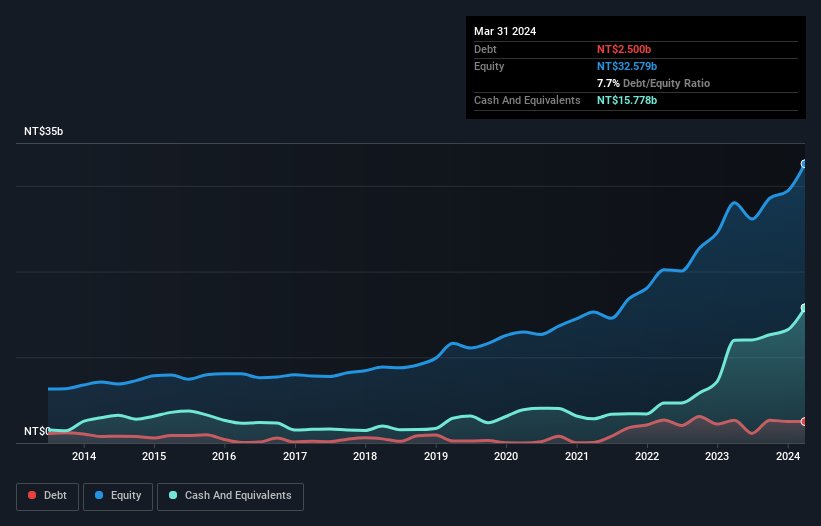- Taiwan
- /
- Electronic Equipment and Components
- /
- TWSE:3533
Lotes (TWSE:3533) Seems To Use Debt Quite Sensibly

David Iben put it well when he said, 'Volatility is not a risk we care about. What we care about is avoiding the permanent loss of capital.' So it seems the smart money knows that debt - which is usually involved in bankruptcies - is a very important factor, when you assess how risky a company is. We can see that Lotes Co., Ltd (TWSE:3533) does use debt in its business. But should shareholders be worried about its use of debt?
When Is Debt A Problem?
Debt and other liabilities become risky for a business when it cannot easily fulfill those obligations, either with free cash flow or by raising capital at an attractive price. In the worst case scenario, a company can go bankrupt if it cannot pay its creditors. However, a more usual (but still expensive) situation is where a company must dilute shareholders at a cheap share price simply to get debt under control. By replacing dilution, though, debt can be an extremely good tool for businesses that need capital to invest in growth at high rates of return. When we think about a company's use of debt, we first look at cash and debt together.
Check out our latest analysis for Lotes
What Is Lotes's Debt?
The image below, which you can click on for greater detail, shows that Lotes had debt of NT$2.50b at the end of March 2024, a reduction from NT$2.67b over a year. However, its balance sheet shows it holds NT$15.8b in cash, so it actually has NT$13.3b net cash.

How Healthy Is Lotes' Balance Sheet?
The latest balance sheet data shows that Lotes had liabilities of NT$7.23b due within a year, and liabilities of NT$1.73b falling due after that. Offsetting these obligations, it had cash of NT$15.8b as well as receivables valued at NT$10.5b due within 12 months. So it actually has NT$17.3b more liquid assets than total liabilities.
This short term liquidity is a sign that Lotes could probably pay off its debt with ease, as its balance sheet is far from stretched. Succinctly put, Lotes boasts net cash, so it's fair to say it does not have a heavy debt load!
Fortunately, Lotes grew its EBIT by 3.2% in the last year, making that debt load look even more manageable. There's no doubt that we learn most about debt from the balance sheet. But it is future earnings, more than anything, that will determine Lotes's ability to maintain a healthy balance sheet going forward. So if you want to see what the professionals think, you might find this free report on analyst profit forecasts to be interesting.
Finally, a business needs free cash flow to pay off debt; accounting profits just don't cut it. While Lotes has net cash on its balance sheet, it's still worth taking a look at its ability to convert earnings before interest and tax (EBIT) to free cash flow, to help us understand how quickly it is building (or eroding) that cash balance. Over the most recent three years, Lotes recorded free cash flow worth 59% of its EBIT, which is around normal, given free cash flow excludes interest and tax. This free cash flow puts the company in a good position to pay down debt, when appropriate.
Summing Up
While we empathize with investors who find debt concerning, you should keep in mind that Lotes has net cash of NT$13.3b, as well as more liquid assets than liabilities. So is Lotes's debt a risk? It doesn't seem so to us. The balance sheet is clearly the area to focus on when you are analysing debt. But ultimately, every company can contain risks that exist outside of the balance sheet. We've identified 1 warning sign with Lotes , and understanding them should be part of your investment process.
Of course, if you're the type of investor who prefers buying stocks without the burden of debt, then don't hesitate to discover our exclusive list of net cash growth stocks, today.
New: AI Stock Screener & Alerts
Our new AI Stock Screener scans the market every day to uncover opportunities.
• Dividend Powerhouses (3%+ Yield)
• Undervalued Small Caps with Insider Buying
• High growth Tech and AI Companies
Or build your own from over 50 metrics.
Have feedback on this article? Concerned about the content? Get in touch with us directly. Alternatively, email editorial-team (at) simplywallst.com.
This article by Simply Wall St is general in nature. We provide commentary based on historical data and analyst forecasts only using an unbiased methodology and our articles are not intended to be financial advice. It does not constitute a recommendation to buy or sell any stock, and does not take account of your objectives, or your financial situation. We aim to bring you long-term focused analysis driven by fundamental data. Note that our analysis may not factor in the latest price-sensitive company announcements or qualitative material. Simply Wall St has no position in any stocks mentioned.
About TWSE:3533
Lotes
Designs, manufactures, and sells electronic interconnect and hardware components in Taiwan, Mainland China, and internationally.
Outstanding track record with high growth potential.
Similar Companies
Market Insights
Community Narratives




